

Why Change Happens: Ten Theories. One of the grandest — and most frustrating — things about carrying on the great democratic conversation via blog is finding out how many of your fellow citizens (including many who are nominally on your side) turn out to be looking at the world from a completely different set of assumptions than you are.
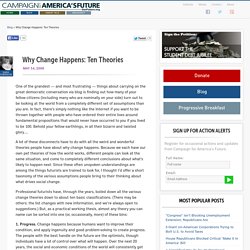
In fact, there’s simply nothing like the Internet if you want to be thrown together with people who have ordered their entire lives around fundamental propositions that would never have occurred to you if you lived to be 100. Behold your fellow earthlings, in all their bizarre and twisted glory…. A lot of these disconnects have to do with all the weird and wonderful theories people have about why change happens. 10 Big Mistakes People Make in Thinking About the Future. Photo Credit: Frank Peters Being a working futurist means that I think a lot about how people think about the future.
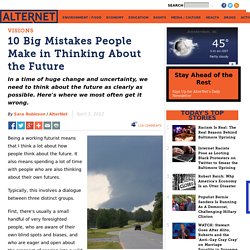
It also means spending a lot of time with people who are also thinking about their own futures. Typically, this involves a dialogue between three distinct groups. First, there's usually a small handful of very foresighted people, who are aware of their own blind spots and biases, and who are eager and open about the prospect of soaring into a wild blue sky to gather a lot of exciting new information. Aca2b7fc-b15e-46db-8ab9-bca53b25365d.pdf. Google Glass Doesn’t Have a Privacy Problem. You Do. Partnersineducation.spruz.com/gfile/75r4!-!HLKGKF!-!svyr5/kc_foresight_workbook.pdf. If You're Not Pissing Someone Off, You're Probably Not Innovating - Philip Auerswald. By Philip Auerswald | 9:58 AM May 4, 2012 As the editor of the journal Innovations, I’m asked with some regularity, “So, what is innovation anyhow?

How would you…”? (eyebrows usually furrow here) “… define it?” Since I don’t particularly enjoy debating definitions, I usually respond by saying: “That’s a difficult question. But one thing is for sure: If you’re not pissing someone off, it’s probably not innovation.” I like this response because, if it doesn’t end the conversation, it usually shifts it from definitions to dynamics — which is what innovation is all about, after all. There’s nothing new here. To undertake such new things is difficult and constitutes a distinct economic function, first because they lie outside the routine tasks which everyone understands and, secondly, because the environment resists in many ways that will vary, according to social conditions, from simple refusal either to finance or buy a new thing, to physical attack on the man who tries to produce it. 8 Visionaries on How They Spot the Future. Paul Saffo A longtime technology forecaster, Saffo is a managing director at the Silicon Valley investment research firm Discern.
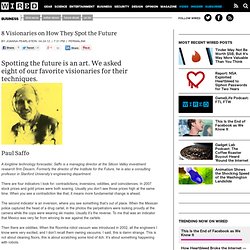
Formerly the director of the Institute for the Future, he is also a consulting professor in Stanford University’s engineering department. There are four indicators I look for: contradictions, inversions, oddities, and coincidences. In 2007 stock prices and gold prices were both soaring. 6 Habits of True Strategic Thinkers. In the beginning, there was just you and your partners.
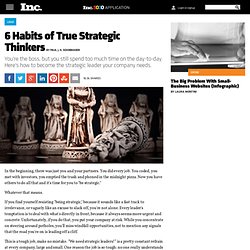
You did every job. You coded, you met with investors, you emptied the trash and phoned in the midnight pizza. Now you have others to do all that and it's time for you to "be strategic. " Whatever that means. If you find yourself resisting "being strategic," because it sounds like a fast track to irrelevance, or vaguely like an excuse to slack off, you're not alone. This is a tough job, make no mistake. After two decades of advising organizations large and small, my colleagues and I have formed a clear idea of what's required of you in this role.
Anticipate Most of the focus at most companies is on what’s directly ahead. Look for game-changing information at the periphery of your industrySearch beyond the current boundaries of your businessBuild wide external networks to help you scan the horizon better. 10 Big Mistakes People Make in Thinking About the Future. The Social Sciences’ ‘Physics Envy’ Ito's Nine Principles. The Art of Observation and How to Master the Crucial Difference Between Observation and Intuition.
By Maria Popova Why genius lies in the selection of what is worth observing.
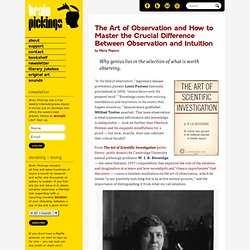
“In the field of observation,” legendary disease prevention pioneer Louis Pasteur famously proclaimed in 1854, “chance favors only the prepared mind.” “Knowledge comes from noticing resemblances and recurrences in the events that happen around us,” neuroscience godfather Wilfred Trotter asserted. That keen observation is what transmutes information into knowledge is indisputable — look no further than Sherlock Holmes and his exquisite mindfulness for a proof — but how, exactly, does one cultivate that critical faculty? From The Art of Scientific Investigation (public library; public domain) by Cambridge University animal pathology professor W. Though a number of celebrated minds favored intuition over rationality, and even Beveridge himself extolled the merits of the intuitive in science, he sides with modern-day admonitions about our tendency to mislabel other cognitive processes as “intuition” and advises: